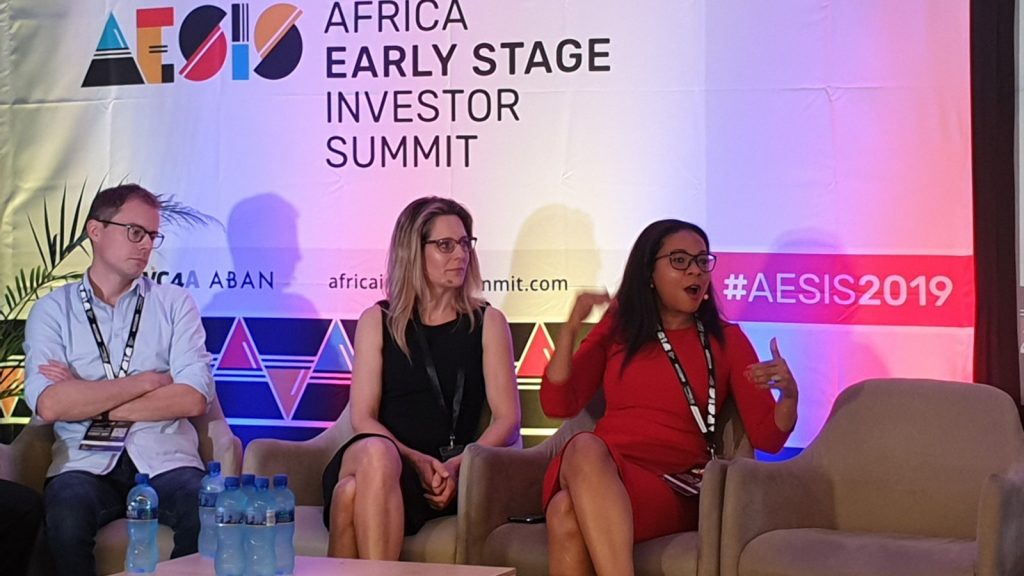Africa’s tech startup ecosystem may be growing, but the sector is far from being an even playing field, argues Africa Business Angel Network’s (ABAN) and Cameroon Angel’s Rebecca Enonchong.
Speaking yesterday during a panel discussion at the Africa Early Stage Investment Summit (AESIS) in Cape Town, Enonchong (pictured above, far right, with other panelists) eluded to the shortage of female tech founders in Africa and questioned the role foreign founders play in the continent’s tech sector.
No ad to show here.
“So, when you look at the numbers represented earlier, when you look at the percentage of women, for instance, that are co-founding some of these companies.
“When we look at how many are actually African founders, versus foreign founders that are on the continent, those are some of the questions that we have to ask as numbers grow. Are they growing for our ecosystem or are we still developing developed countries?
“Those are some of the questions we really have to ask ourselves, development yes, but development for who?” she said.
Enonchong was responding to a question posed by venture capitalist and Knife Capital partner Keet van Zyl on the state of the continent’s startup ecosystem.
Foreign founders, male founders still dominate Africa’s tech sector – Enonchong
The panel, comprised of Proparco’s Johann Choux, Naspers’ Louise Stuart and EchoVC’s Eghosa Omoigui, discussed the current investment climate in Africa.
‘Every African business has social impact’
Later in the discussion, Enonchong spoke about the expectations that some investors have around social impact when they invest in African startups.
“That is the most annoying and frustrating thing. It’s already so hard to be an African entrepreneur. It’s already so hard on the ground and then you add another requirement that nobody else has to deal with. A Silicon Valley entrepreneur doesn’t have to show social impact.
“Every business in Africa has social impact because you’re creating jobs, you’re creating wealth. You’re feeding families with your salaries. So, it will always have a social impact even if it’s a gaming company, ” she said.
She recalled comments made by non-Africans around the time when Netflix launched on the continent. She said some of them had said Africans didn’t need Netflix, but water and electricity instead.
Africans, she pointed out, consume a lot of entertainment and that on its own is an investment opportunity.
“If you’re not looking at that as an investment opportunity, you’re missing it. The idea of taking western values and applying them to the African context in order to determine whether a startup is deserving is not going to make you successful as an investor,” she said.
‘Africans have long been angel investing’
Enonchong pointed out that angel investing is something Africans have been doing for “a very long time”. “But, we’ve never called it angel investing,” she said.
She said one of the challenges facing the African angel investing community is matching the terminology and lingo the industry is developing to the people that are actually investing.
“A lot of investors are investors that don’t identify as angel investors, so they get missed from the whole conversation and those investments aren’t included in any list of any kind because these people haven’t realised that what they are doing is angel investing,” said Enonchong.
She also said there was a need to provide training for angel investors. “We need to gather these investors that are left and right and help structure them so they can be part of the system,” said Enonchong.
Catalyst initiative
To encourage angel investing on the continent, ABAN and AfriLabs‘ Catalyst initiative will provide up to €60 000 in selected transactions through a matching or co-investment programme.
The initiative was launched in September (see this story). Afrilabs is a network for technology hubs and innovation centres.
“The idea is we want more angel ivnestors, and how do we encourage angel investors? Angel investors have limited capital, very limited capital. If now through this programme they can invest in four startups instead of just two, then we would have encourage and helped from the lowest layer of investment,” she said.
She explained that if the angel community grows then the VC community will have more of a pipeline.
AESIS 2019 kicked off on Wednesday at Workshop 17 at the Waterfront in Cape Town. It ends today. The first day of the summit featured a series of investor masterclasses and workshops.
The summit is an initiative of VC4A and the Africa Business Angel Network (ABAN). It brings together leading investors from Africa and beyond to network, exchange insights, create partnerships and make deals.
Read more: Raising funding in Africa? Here are 12 venture capitalists you should know about
Read more: ABAN, AfriLabs initiative Catalyst aims to match funding by angels in startups
Read more: VC is growing in Africa, but sector still hobbled by lack of follow-on and seed funding
Read more: So, let’s call it out – what then is an African startup?
Featured image, left to right:Proparco’s Johann Choux, Naspers’ Louise Stuart and Africa Business Angel Network’s and Cameroon Angel’s Rebecca Enonchong (VC4A )
